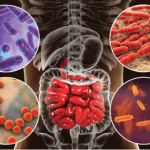The hygiene hypothesis is the belief that exposure to infectious agents may help protect us from immune-related disorders, through antigenic competition, alterations in immunoregulation, and promotion of a Th1 vs. Th2 response. By decreasing our exposure to infections, antibiotics and improvements in hygiene may have increased our tendency to develop autoimmune diseases.
Mouse Model Gives Additional Information
Researchers also looked at a mouse model in which mice were exposed to R. intestinalis to induce β2GPI-specific lymphocytes and antibodies. As a control, they selected Bacteroides thetaiotaomicron (B. thetaiotaomicron). Lymphocytes from the spleen or peripheral lymph nodes of R. intestinalis mice proliferated more to recombinant human β2GPI than to B. thetaiotaomicron or sham-immunized mice.
They next immunized mice with a R. intestinalis lysate (with Freund’s adjuvant) over 48 days to allow for a full antibody response to develop. Mice immunized with R. intestinalis had higher titers of serum anti-β2GPI IgG antibodies compared with controls. IgG antibodies to R. intestinalis DNA methyltranserfase (DNMT), containing the major APS B cell epitope, were also markedly increased compared to B. thetaiotaomicron or sham controls.
To determine if gut colonization with R. intestinalis would affect a rodent model with a genetic predisposition to spontaneously developing APS, they chose the (NZW x BXSB) male F1 hybrid mouse, which can develop an early, lupus-like disease. Deaths in this strain usually occur by 30 weeks because of anti-β2GPI autoantibody production leading to coronary microthrombi and myocardial infarctions.
All mice were treated with vancomycin prior to introduction of R. intestinalis. This treatment was done to prevent F1 mice from developing antibodies against other organisms in the microbiome, as well as to open a colonic niche for the human bacterium.
After pretreatment, investigators exposed the mice to fresh cultures of R. intestinalis or a sterile growth medium as a control. Autoantibody titers in mice infected with R. int were markedly above the titers observed in mice exposed to growth medium alone. Human anti-β2GPI IgG was positively correlated to anti-R. intestinalis DNA methyltransferase IgG similar to that seen in APS patient sera.
The researchers also noted that R. intestinalis exposed mice showed extensive inflammation in both the myocardium and subendocardium. This finding, along with lymphocytic infiltrates and necrosis, was not seen in controls that survived beyond 30 weeks. Lymphocytic infiltrates were also found in the lungs of the exposed mice, but not controls.
Genome & Microbiome Intertwined
“In some ways, the microbiome is not that much different from the host genome,” says Dr. Kriegel. “There are genetic risk factors in which we know a patient is predisposed to developing a given disease. It also appears there are some elements of the microbiome that make a person more susceptible to a disease, such as APS.”

